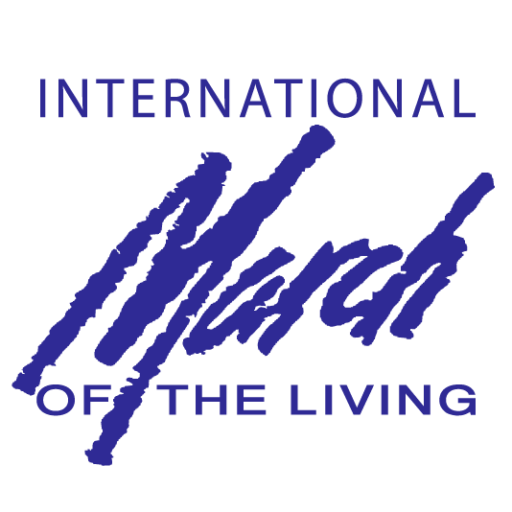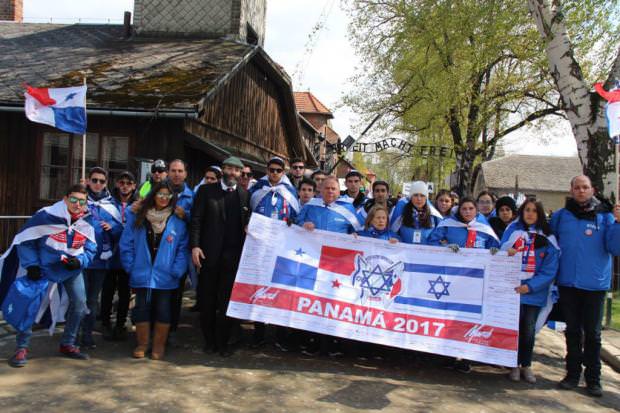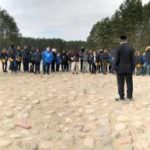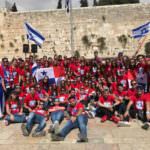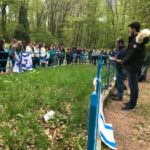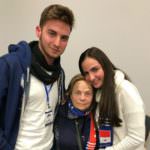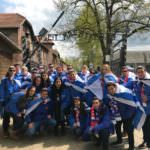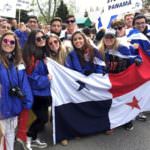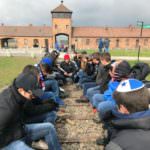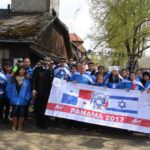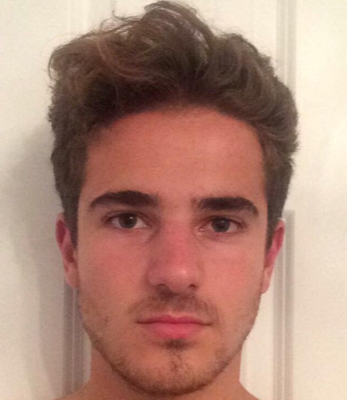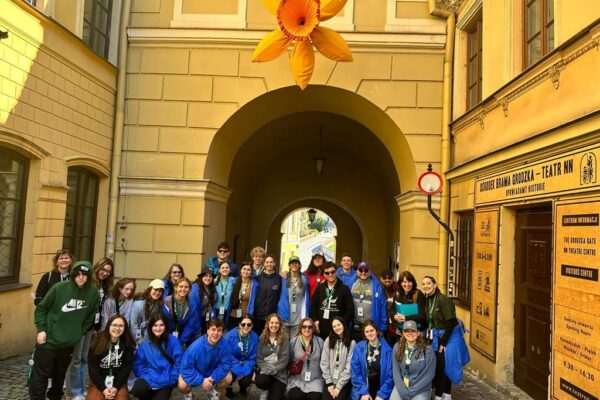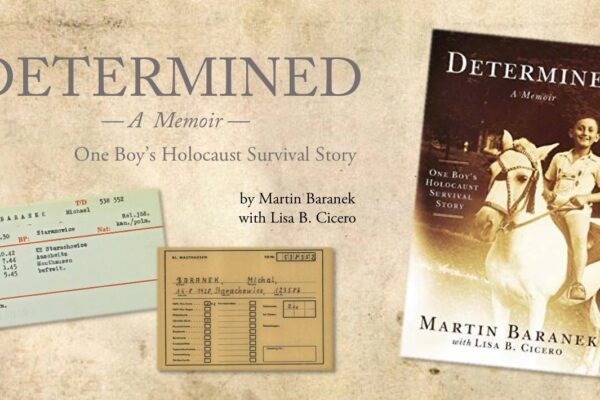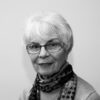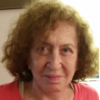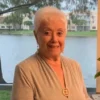SCROLL DOWN FOR ENGLISH TRANSLATION …
Semanas atrás marchamos junto a nuestros compañeros panameños a través del portón de Auschwitz, culminando una experiencia que cambió nuestras vidas. Nuestra delegación tuvo el privilegio de encabezar todas las que estaban en formación, marchando en primera fila. cargamos nuestras banderas con orgullo, dirigiendo a los 10 mil marchantes provenientes de todas partes del mundo. Nos llegó al corazón cómo todos estábamos unidos por un mismo objetivo: recordar y transmitir, para que una tragedia como esta jamás vuelva a suceder.
La Marcha de la Vida es una viaje que se realiza todos los años en Polonia, donde miles de participantes recuerdan y honran la memoria de los fallecidos bajo el régimen nazi. El viaje culmina con un recorrido desde el campo de exterminio de Auschwitz hasta el de Birkenau. Jóvenes de todo el mundo se reúnen en este Día de Recuerdo a las Víctimas del Holocausto.
Antes de viajar, todo era un sentimiento abstracto que pintábamos en nuestra imaginación: una mezcla de nombres, lugares y fechas. Nos preparamos todo un año con la intención de llegar y entender, pero no fue así. Pensábamos encontrar todo como en aquellos retratos blanco y negro. Para nuestra sorpresa, todo parecía haber florecido. La evidencia había sido borrada en su gran parte y era difícil imaginar que semejante atrocidad había sucedido donde estábamos parados.
Visitamos el campo de Plaszow en Polonia. Lo que años atrás fue un campo de exterminio, ahora era un paisaje de hermosas montañas verdes. Encontramos familias paseando a sus mascotas, niños jugando; no caían en la cuenta que 8 mil almas descansaban allí… Todo parecía ser olvidado. Algo que nos llamó mucho la atención fue que el campo estaba ubicado frente a una carretera, lo que nos hizo preguntarnos, ¿cómo es posible que las personas que por allí pasaban no fueron capaces de alzar sus voces ni sus miradas?
Nos impactaron los números, la magnitud de los hechos. Cómo imaginar que 11 millones de personas fueron asesinadas durante la guerra. Al visitar los campos, vimos diferentes exhibiciones de las pertenencias de las personas que allá llegaban. Vimos montones de utensilios de cocina, artículos religiosos, infinidad de zapatos, pero no fue hasta que vimos montañas de cabello humano, que algo tocó nuestro corazón.
Eso no fue suficiente: previo a eso, las horribles condiciones en el gueto, el extenso e incómodo viaje en un vagón de ganado hacia un lugar donde su destino sería marcado. Eran transportados a lo que eran llamados campos de concentración, pero eran en realidad campos de exterminio. Nuestras manos sentían esos rasguños en la pared donde una vez hubo una niña, una madre, una abuela descalza y sin ropa, donde les arrancaron su dignidad y perdieron su identidad, donde fueron empujados sin piedad. Ilusionados que finalmente se iban a poder bañar, reconocerse a sí mismos frente al espejo; pero solo después se dieron cuenta de que era un engaño, mientras marchaban hacia las cámaras de gas.
Durante el viaje conocimos diferentes ciudades donde la vida judía fue muy importante. Vimos cientos de sinagogas abandonadas, pues ya no queda quien se ocupe de ellas. Tuvimos el privilegio de pasar el shabat en una, y revivir sus días de esplendor, cuando siempre estaba llena.
Un día fuimos a caminar por el bosque de Zbylitowska Gora. Los pájaros cantaban y los frondosos árboles bailaban con el viento; era un lugar realmente hermoso. Nos impactó darnos cuenta de que estos árboles guardaban el secreto de todo lo que había pasado. Los judíos de un pueblo cercano fueron llevados ahí, asesinados a punta de disparos, y enterrados en fosas comunes. La que más nos estremeció fue la de los niños. Cómo pensar en niñas como nosotras que jamás pudieron cumplir sus sueños. Nos sorprendió cómo la vida fue arrancada de almas jóvenes y puras sin piedad.
Estos niños y todas estas personas fueron víctimas del Holocausto; mundos destruidos que nunca se podrán reponer. Pero aquí nuestro enfoque hacia la vida cambió, los días adquirieron valor y nuestras lágrimas se transformaron en fuente de inspiración, con ganas de seguir adelante en honor a todos estos niños que jamás pudieron hacerlo.
Nos impresionó todo lo que vimos, por la inmensidad del lugar, por la organización de este exterminio masivo y cruel, por los viejos árboles, fieles testigos de lo sucedido, pero en especial por el frío.
Un frío que nos llegaba hasta los huesos, que hacía que cada esquina de nuestro ser se sacudiera, un frío que ni siquiera le pertenecía al invierno, pero que nos hizo apreciar el amor a la vida y la valentía que tenían aquellos que eran puestos a trabajar, y que mantenían las ganas de vivir. Nos maravillamos por los que sobrevivieron con valor, coraje y perseverancia.
Fuimos afortunados de contar con la compañía de una sobreviviente, una heroína, Mania Hudy. Junto a ella revivimos momentos de su niñez, escuchamos sus historias, la vimos llorar. Nos dimos cuenta de que aun después de 72 años, el recuerdo perdura en su interior y mientras viva debemos aprovechar sus enseñanzas. Fue ella quien nos calmó en los momentos más tristes y nos llenó de fe. Siempre nos preocupábamos de que no se perdiera mientras caminábamos; ella nos contestaba: “no se preocupen. Si no me perdí durante el Holocausto, cuando tenía ocho años, no me perderé aquí hoy”.
Marchamos en Auschwitz no para demostrar odio, sino para manifestar todo lo contrario: somos una nación que recuerda; que valora cada vida.
Manteniendo nuestra identidad y nuestros valores, estando orgullosos de quienes somos y de donde pertenecemos, lograremos encontrar la esperanza y perseverancia. Esto nos distinguirá como mejores personas, para hacer de este mundo uno de tolerancia, de respeto, donde uno se preocupa por el otro, donde no nos quedamos callados ante injusticias. Solo así podremos brindar, luz, alegría y progreso al mundo. Recordar y educar siempre será lo que nos prometa que una tragedia como esta jamás vuelva a pasar.
* Las autoras son alumnas de 12avo grado del Instituto Alberto Einstein y la Academia Hebrea de Panamá.
—
ENGLISH TRANSLATION
Weeks ago we marched along with our Panamanian companions through the gate of Auschwitz, culminating an experience that changed our lives. Our delegation had the privilege of leading all those in formation, marching in the front row. We proudly carry our flags, directing the 10,000 marchers from all over the world. It came to our heart how we were all united by the same goal: to remember and to transmit, so that a tragedy like this will never happen again.
The March of Life is a journey that takes place every year in Poland, where thousands of participants remember and honor the memory of those who died under the Nazi regime. The journey culminates in a journey from the Auschwitz extermination camp to Birkenau. Young people from all over the world gather on this Memorial Day to the victims of the Holocaust.
Before traveling, everything was an abstract feeling that we painted in our imagination: a mixture of names, places and dates. We prepared a whole year with the intention of arriving and understanding, but it was not so. We thought we would find everything as in those black and white portraits. To our surprise, everything seemed to have bloomed. The evidence had largely been obliterated, and it was hard to imagine that such an atrocity had happened where we were standing.
We visited the Plaszow camp in Poland. What years ago was an extermination camp, it was now a landscape of beautiful green mountains. We found families walking their pets, children playing; It did not fall to the account that 8,000 souls were resting there … Everything seemed to be forgotten. Something that caught our attention was that the field was located in front of a road, which made us wonder, how is it possible that the people who passed by were not able to raise their voices or their looks?
We were struck by the numbers, the magnitude of the facts. How to imagine that 11 million people were killed during the war. When we visited the fields, we saw different exhibitions of the belongings of the people who arrived there. We saw lots of cooking utensils, religious items, lots of shoes, but it was not until we saw mountains of human hair that something touched our heart.
That was not enough: before that, the horrible conditions in the ghetto, the long and uncomfortable journey in a cattle car to a place where his destiny would be marked. They were transported to what were called concentration camps, but were actually death camps. Our hands felt those scratches on the wall where once there was a girl, a mother, a barefoot grandmother and without clothes, where they ripped their dignity and lost their identity, where they were pushed mercilessly. Illusioned that they were finally going to be able to bathe, to recognize themselves in front of the mirror; But only later did they realize that it was a hoax as they marched toward the gas chambers.
During the trip we met different cities where Jewish life was very important. We saw hundreds of abandoned synagogues, because there is no one left to look after them. We had the privilege of spending the Sabbath in one, and reliving its days of splendor, when it was always full.
One day we went to walk through the forest of Zbylitowska Gora. The birds sang and the leafy trees danced with the wind; It was a really beautiful place. We were shocked to realize that these trees kept the secret of everything that had happened. The Jews of a nearby town were taken there, killed by gunfire, and buried in mass graves. The one that most shook us was the children. How to think of girls like us who could never fulfill their dreams. We were surprised how life was torn from young and pure souls without mercy.
These children and all these people were victims of the Holocaust; Worlds that can never be restored. But here our focus on life changed, the days acquired value and our tears became a source of inspiration, wanting to move forward in honor of all these children who could never do it.
We were impressed by everything we saw, by the immensity of the place, by the organization of this mass extermination and cruel, by the old trees, faithful witnesses of what happened, but especially by the cold.
A cold that reached our bones, which caused every corner of our being to shake, a cold that did not even belong to the winter, but that made us appreciate the love of life and courage that had been put to Work, and that kept the desire to live. We marvel at those who survived with courage, courage and perseverance.
We were fortunate to have the company of a survivor, a heroine, Mania Hudy. Together with her we relived moments of her childhood, we heard her stories, we saw her crying. We realized that even after 72 years, the memory endures within and while we live we must take advantage of its teachings. It was she who calmed us in the saddest moments and filled us with faith. We always worried that he would not get lost while we were walking; She would answer: “Do not worry. If I did not get lost during the Holocaust, when I was eight years old, I will not get lost here today. ”
We march in Auschwitz not to show hatred, but to manifest the opposite: we are a nation that remembers; Which values each life.
Maintaining our identity and our values, being proud of who we are and where we belong, we will find hope and perseverance. This will distinguish us as better people, to make this world one of tolerance, respect, where one cares for the other, where we do not remain silent in the face of injustice. Only in this way will we be able to bring light, joy and progress to the world. Remembering and educating will always be what promises us that a tragedy like this will never happen again.
* The authors are 12th grade students of the Alberto Einstein Institute and the Hebrew Academy of Panama.
